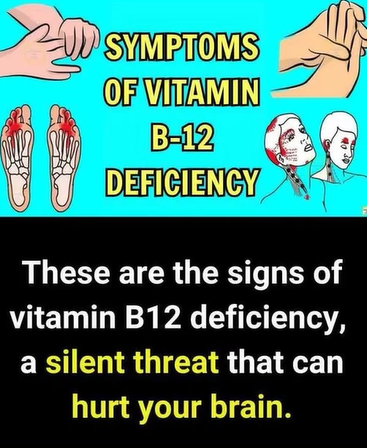Unusual FatigueFeeling tired even after a full night’s sleep? Vitamin B12 is essential for oxygen delivery in the blood. A lack of it means your body doesn’t get enough oxygen—leaving you drained, weak, and sluggish. Tingling or Numbness in Hands and Feet A pins-and-needles sensation in your extremities can signal nerve damage caused by prolonged B12 deficiency. This symptom is often one of the earliest and most alarming red flags. Pale or Jaundiced Skin Vitamin B12 helps the body produce healthy red blood cells. Without it, your skin may appear pale, or even slightly yellow due to broken red blood cells releasing bilirubin. Memory Problems or Brain Fog
Struggling to focus? Forgetting things often? B12 is vital for brain health. Low levels can affect cognition, causing memory lapses and difficulties with concentration. Mood Changes or Depression Studies suggest a link between low B12 levels and mood disorders like anxiety and depression. The vitamin helps produce serotonin, a chemical responsible for mood regulation. Shortness of Breath or Dizziness
If you feel dizzy or short of breath with minimal effort, your red blood cell count might be low due to B12 deficiency. This affects oxygen transport throughout your body. Swollen, Inflamed Tongue A smooth, red, and swollen tongue—also called glossitis—can be an early symptom. It may feel sore and change how you taste food. Vision Problems In severe cases, B12 deficiency can damage the optic nerve, leading to blurred or double vision, light sensitivity, or visual disturbances.
Muscle Weakness or Coordination Issues Trouble with balance or clumsiness might point to neurological damage from long-term B12 shortage. This can affect mobility and daily function Why It Matters Vitamin B12 deficiency is more common than people think, especially among: • People over 50 • Vegans and vegetarians • Those with digestive conditions (like Crohn’s or celiac) • Individuals taking certain medications (e.g., metformin or PPIs) What You Can Do: • Eat B12-rich foods: meat, fish, dairy, eggs, and fortified cereals. • Take a B12 supplement if you’re at risk. • Get your blood levels tested regularly—especially if you experience symptoms. • Consult a healthcare provider for proper diagnosis and treatment. Bottom Line: Don’t ignore the signs. A simple vitamin can make a world of difference in your energy, focus, and overall health. If you’ve noticed any of these symptoms, it’s time to take them seriously—your body is trying to tell you something.
